Swinburne University: Mindfulness and Meditation Benefits Report
VerifiedAdded on 2022/11/28
|13
|3594
|196
Report
AI Summary
This report investigates the empirical associations between mindfulness and wellbeing, focusing on the impact of mindfulness and meditation practices on stress and anxiety reduction, cognitive responses, focus, and life satisfaction. The study involved 250 first-year psychology students, employing an online survey to collect data on meditation habits and various psychological scales. The results revealed positive correlations between mindfulness and life satisfaction, vitality, and positive affect, while a negative correlation was found with negative affect. Meditators showed significantly higher levels of mindfulness, vitality, and positive affect compared to non-meditators. The report discusses the benefits of mindfulness in reducing rumination, stress, and enhancing cognitive functions like working memory and focused attention. The findings support the use of mindfulness practices in psychotherapy and stress management, emphasizing their role in promoting mental wellbeing and emotional regulation. The study utilized various scales to measure mindfulness, positive and negative affect, vitality, and life satisfaction, analyzing the data using Pearson correlations and independent t-tests to compare meditators and non-meditators. The report provides a detailed analysis of the findings, including correlation tables and comparisons between the two groups, highlighting the significant benefits of mindfulness and meditation practices on psychological wellbeing.
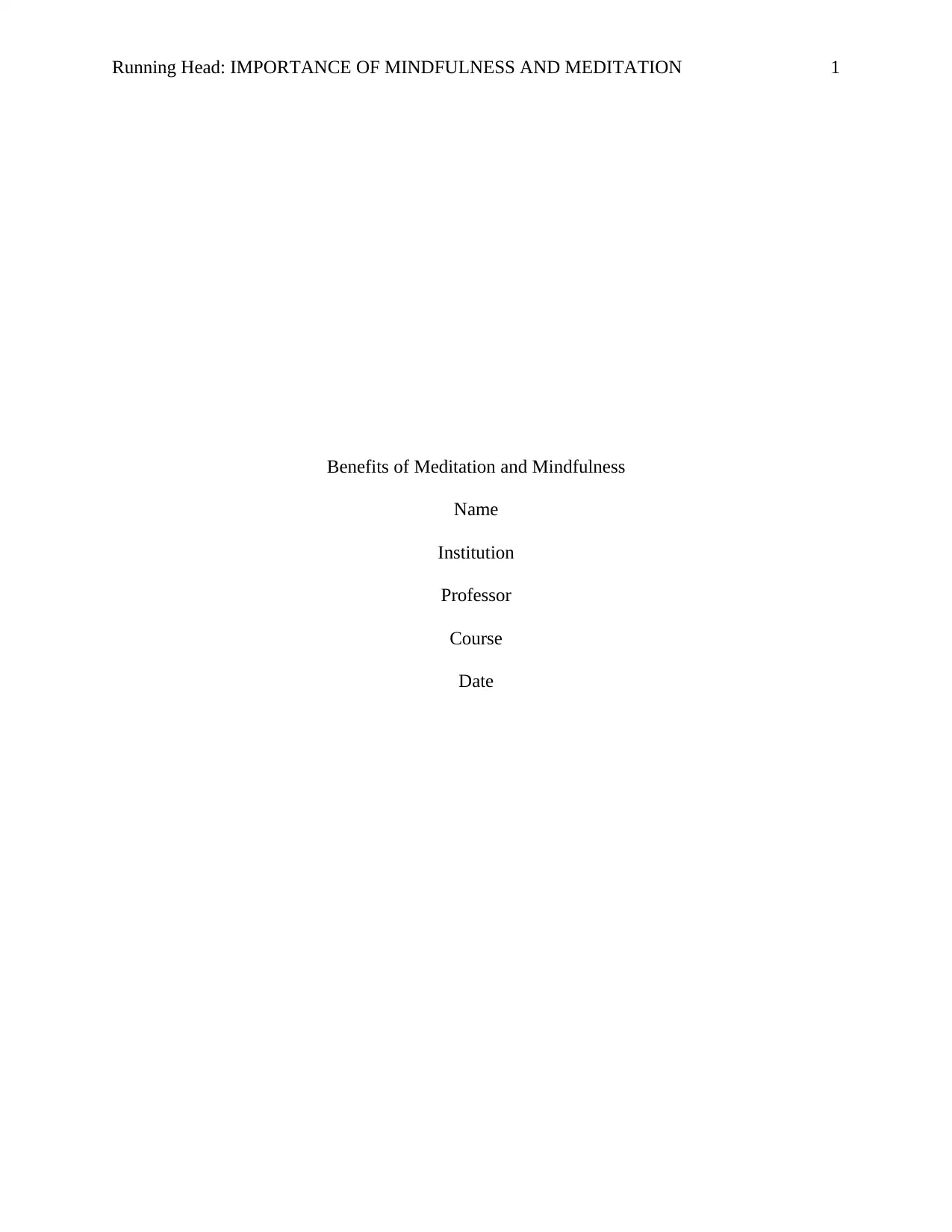
Running Head: IMPORTANCE OF MINDFULNESS AND MEDITATION 1
Benefits of Meditation and Mindfulness
Name
Institution
Professor
Course
Date
Benefits of Meditation and Mindfulness
Name
Institution
Professor
Course
Date
Paraphrase This Document
Need a fresh take? Get an instant paraphrase of this document with our AI Paraphraser
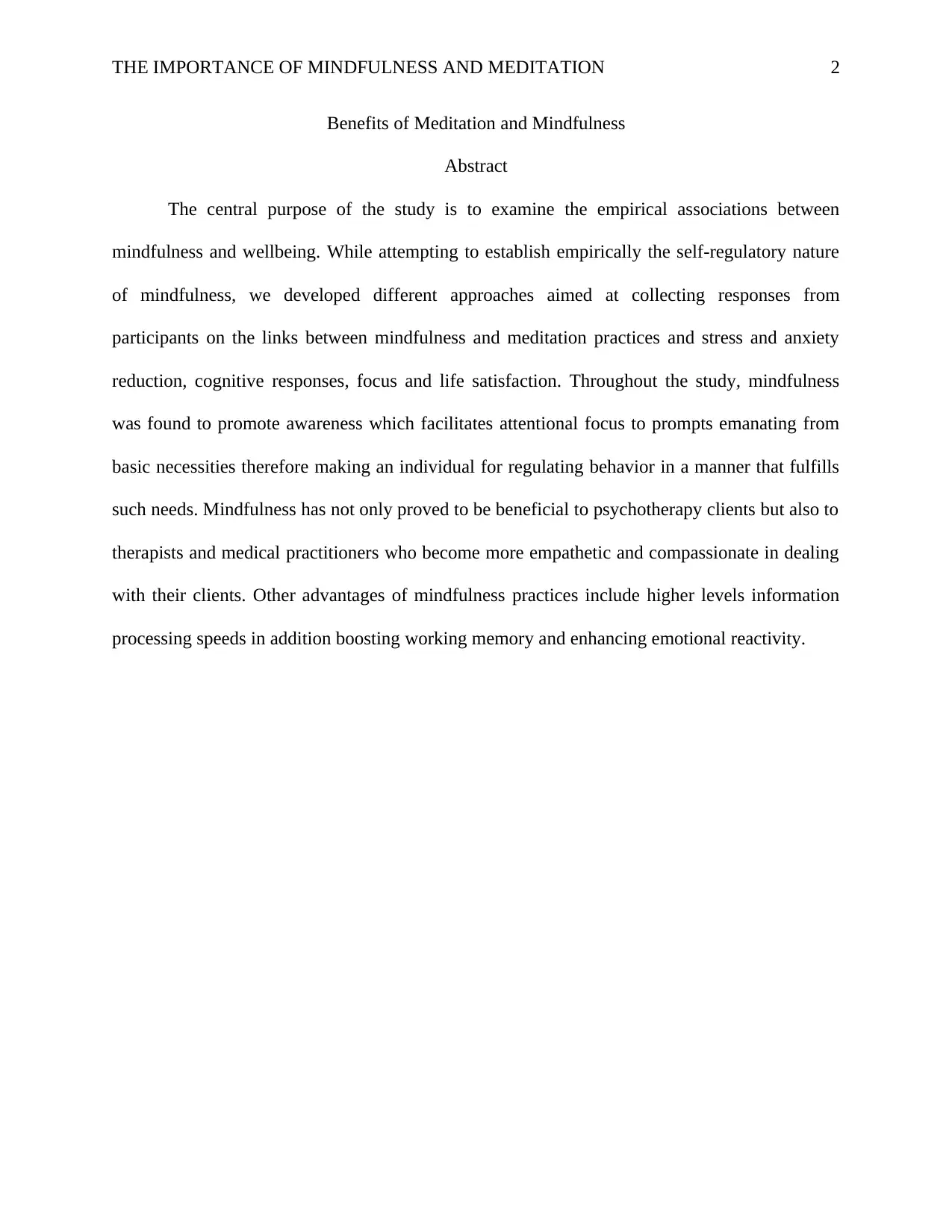
THE IMPORTANCE OF MINDFULNESS AND MEDITATION 2
Benefits of Meditation and Mindfulness
Abstract
The central purpose of the study is to examine the empirical associations between
mindfulness and wellbeing. While attempting to establish empirically the self-regulatory nature
of mindfulness, we developed different approaches aimed at collecting responses from
participants on the links between mindfulness and meditation practices and stress and anxiety
reduction, cognitive responses, focus and life satisfaction. Throughout the study, mindfulness
was found to promote awareness which facilitates attentional focus to prompts emanating from
basic necessities therefore making an individual for regulating behavior in a manner that fulfills
such needs. Mindfulness has not only proved to be beneficial to psychotherapy clients but also to
therapists and medical practitioners who become more empathetic and compassionate in dealing
with their clients. Other advantages of mindfulness practices include higher levels information
processing speeds in addition boosting working memory and enhancing emotional reactivity.
Benefits of Meditation and Mindfulness
Abstract
The central purpose of the study is to examine the empirical associations between
mindfulness and wellbeing. While attempting to establish empirically the self-regulatory nature
of mindfulness, we developed different approaches aimed at collecting responses from
participants on the links between mindfulness and meditation practices and stress and anxiety
reduction, cognitive responses, focus and life satisfaction. Throughout the study, mindfulness
was found to promote awareness which facilitates attentional focus to prompts emanating from
basic necessities therefore making an individual for regulating behavior in a manner that fulfills
such needs. Mindfulness has not only proved to be beneficial to psychotherapy clients but also to
therapists and medical practitioners who become more empathetic and compassionate in dealing
with their clients. Other advantages of mindfulness practices include higher levels information
processing speeds in addition boosting working memory and enhancing emotional reactivity.
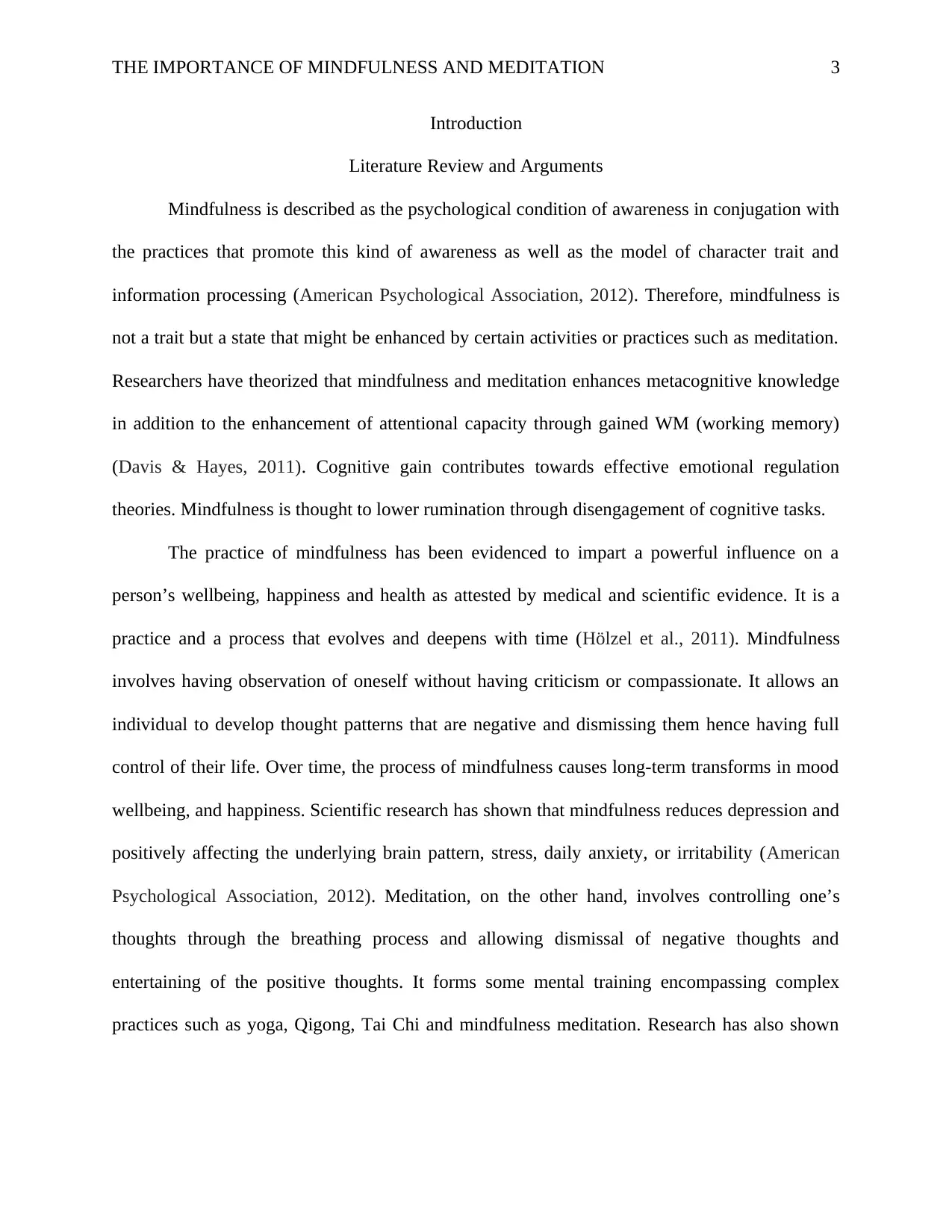
THE IMPORTANCE OF MINDFULNESS AND MEDITATION 3
Introduction
Literature Review and Arguments
Mindfulness is described as the psychological condition of awareness in conjugation with
the practices that promote this kind of awareness as well as the model of character trait and
information processing (American Psychological Association, 2012). Therefore, mindfulness is
not a trait but a state that might be enhanced by certain activities or practices such as meditation.
Researchers have theorized that mindfulness and meditation enhances metacognitive knowledge
in addition to the enhancement of attentional capacity through gained WM (working memory)
(Davis & Hayes, 2011). Cognitive gain contributes towards effective emotional regulation
theories. Mindfulness is thought to lower rumination through disengagement of cognitive tasks.
The practice of mindfulness has been evidenced to impart a powerful influence on a
person’s wellbeing, happiness and health as attested by medical and scientific evidence. It is a
practice and a process that evolves and deepens with time (Hölzel et al., 2011). Mindfulness
involves having observation of oneself without having criticism or compassionate. It allows an
individual to develop thought patterns that are negative and dismissing them hence having full
control of their life. Over time, the process of mindfulness causes long-term transforms in mood
wellbeing, and happiness. Scientific research has shown that mindfulness reduces depression and
positively affecting the underlying brain pattern, stress, daily anxiety, or irritability (American
Psychological Association, 2012). Meditation, on the other hand, involves controlling one’s
thoughts through the breathing process and allowing dismissal of negative thoughts and
entertaining of the positive thoughts. It forms some mental training encompassing complex
practices such as yoga, Qigong, Tai Chi and mindfulness meditation. Research has also shown
Introduction
Literature Review and Arguments
Mindfulness is described as the psychological condition of awareness in conjugation with
the practices that promote this kind of awareness as well as the model of character trait and
information processing (American Psychological Association, 2012). Therefore, mindfulness is
not a trait but a state that might be enhanced by certain activities or practices such as meditation.
Researchers have theorized that mindfulness and meditation enhances metacognitive knowledge
in addition to the enhancement of attentional capacity through gained WM (working memory)
(Davis & Hayes, 2011). Cognitive gain contributes towards effective emotional regulation
theories. Mindfulness is thought to lower rumination through disengagement of cognitive tasks.
The practice of mindfulness has been evidenced to impart a powerful influence on a
person’s wellbeing, happiness and health as attested by medical and scientific evidence. It is a
practice and a process that evolves and deepens with time (Hölzel et al., 2011). Mindfulness
involves having observation of oneself without having criticism or compassionate. It allows an
individual to develop thought patterns that are negative and dismissing them hence having full
control of their life. Over time, the process of mindfulness causes long-term transforms in mood
wellbeing, and happiness. Scientific research has shown that mindfulness reduces depression and
positively affecting the underlying brain pattern, stress, daily anxiety, or irritability (American
Psychological Association, 2012). Meditation, on the other hand, involves controlling one’s
thoughts through the breathing process and allowing dismissal of negative thoughts and
entertaining of the positive thoughts. It forms some mental training encompassing complex
practices such as yoga, Qigong, Tai Chi and mindfulness meditation. Research has also shown
⊘ This is a preview!⊘
Do you want full access?
Subscribe today to unlock all pages.

Trusted by 1+ million students worldwide
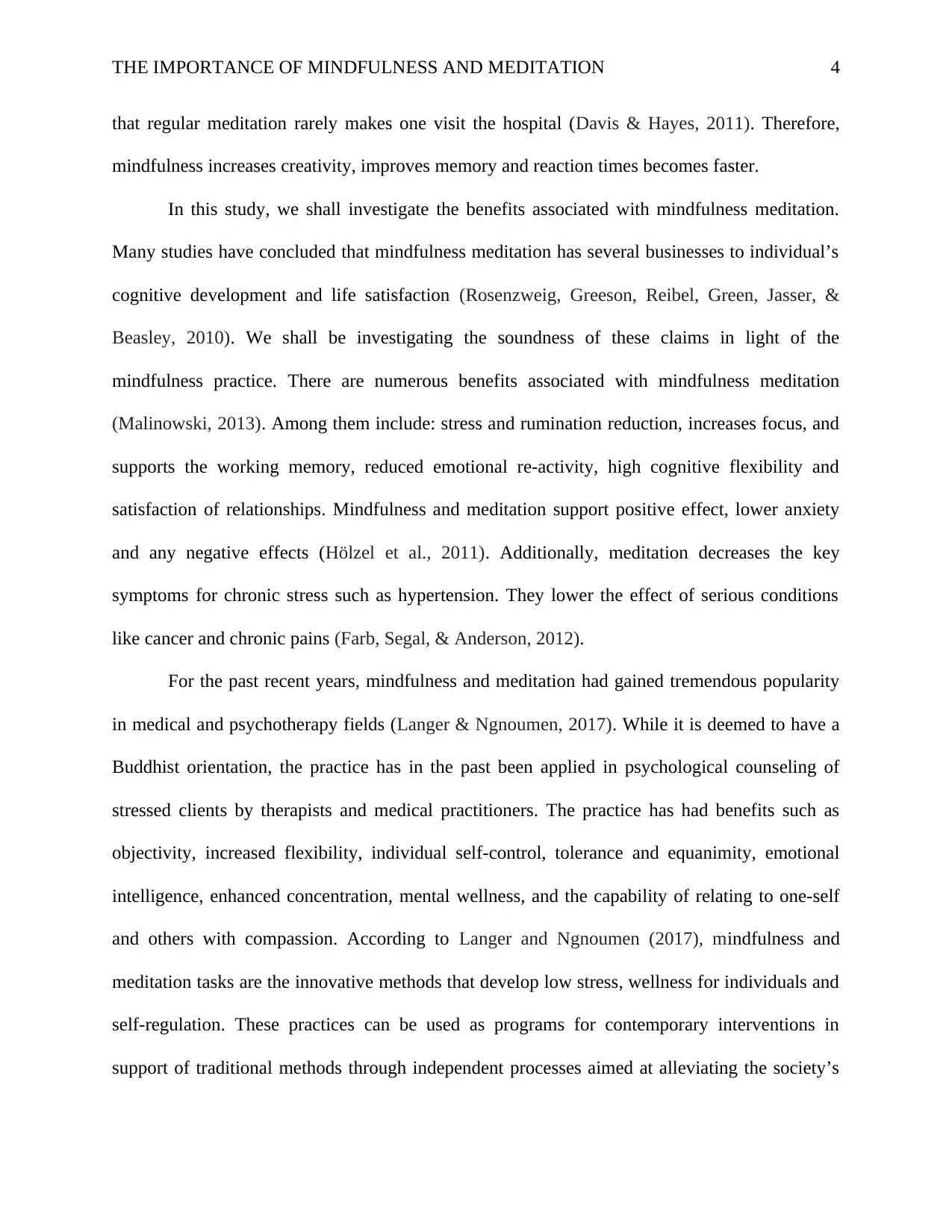
THE IMPORTANCE OF MINDFULNESS AND MEDITATION 4
that regular meditation rarely makes one visit the hospital (Davis & Hayes, 2011). Therefore,
mindfulness increases creativity, improves memory and reaction times becomes faster.
In this study, we shall investigate the benefits associated with mindfulness meditation.
Many studies have concluded that mindfulness meditation has several businesses to individual’s
cognitive development and life satisfaction (Rosenzweig, Greeson, Reibel, Green, Jasser, &
Beasley, 2010). We shall be investigating the soundness of these claims in light of the
mindfulness practice. There are numerous benefits associated with mindfulness meditation
(Malinowski, 2013). Among them include: stress and rumination reduction, increases focus, and
supports the working memory, reduced emotional re-activity, high cognitive flexibility and
satisfaction of relationships. Mindfulness and meditation support positive effect, lower anxiety
and any negative effects (Hölzel et al., 2011). Additionally, meditation decreases the key
symptoms for chronic stress such as hypertension. They lower the effect of serious conditions
like cancer and chronic pains (Farb, Segal, & Anderson, 2012).
For the past recent years, mindfulness and meditation had gained tremendous popularity
in medical and psychotherapy fields (Langer & Ngnoumen, 2017). While it is deemed to have a
Buddhist orientation, the practice has in the past been applied in psychological counseling of
stressed clients by therapists and medical practitioners. The practice has had benefits such as
objectivity, increased flexibility, individual self-control, tolerance and equanimity, emotional
intelligence, enhanced concentration, mental wellness, and the capability of relating to one-self
and others with compassion. According to Langer and Ngnoumen (2017), mindfulness and
meditation tasks are the innovative methods that develop low stress, wellness for individuals and
self-regulation. These practices can be used as programs for contemporary interventions in
support of traditional methods through independent processes aimed at alleviating the society’s
that regular meditation rarely makes one visit the hospital (Davis & Hayes, 2011). Therefore,
mindfulness increases creativity, improves memory and reaction times becomes faster.
In this study, we shall investigate the benefits associated with mindfulness meditation.
Many studies have concluded that mindfulness meditation has several businesses to individual’s
cognitive development and life satisfaction (Rosenzweig, Greeson, Reibel, Green, Jasser, &
Beasley, 2010). We shall be investigating the soundness of these claims in light of the
mindfulness practice. There are numerous benefits associated with mindfulness meditation
(Malinowski, 2013). Among them include: stress and rumination reduction, increases focus, and
supports the working memory, reduced emotional re-activity, high cognitive flexibility and
satisfaction of relationships. Mindfulness and meditation support positive effect, lower anxiety
and any negative effects (Hölzel et al., 2011). Additionally, meditation decreases the key
symptoms for chronic stress such as hypertension. They lower the effect of serious conditions
like cancer and chronic pains (Farb, Segal, & Anderson, 2012).
For the past recent years, mindfulness and meditation had gained tremendous popularity
in medical and psychotherapy fields (Langer & Ngnoumen, 2017). While it is deemed to have a
Buddhist orientation, the practice has in the past been applied in psychological counseling of
stressed clients by therapists and medical practitioners. The practice has had benefits such as
objectivity, increased flexibility, individual self-control, tolerance and equanimity, emotional
intelligence, enhanced concentration, mental wellness, and the capability of relating to one-self
and others with compassion. According to Langer and Ngnoumen (2017), mindfulness and
meditation tasks are the innovative methods that develop low stress, wellness for individuals and
self-regulation. These practices can be used as programs for contemporary interventions in
support of traditional methods through independent processes aimed at alleviating the society’s
Paraphrase This Document
Need a fresh take? Get an instant paraphrase of this document with our AI Paraphraser
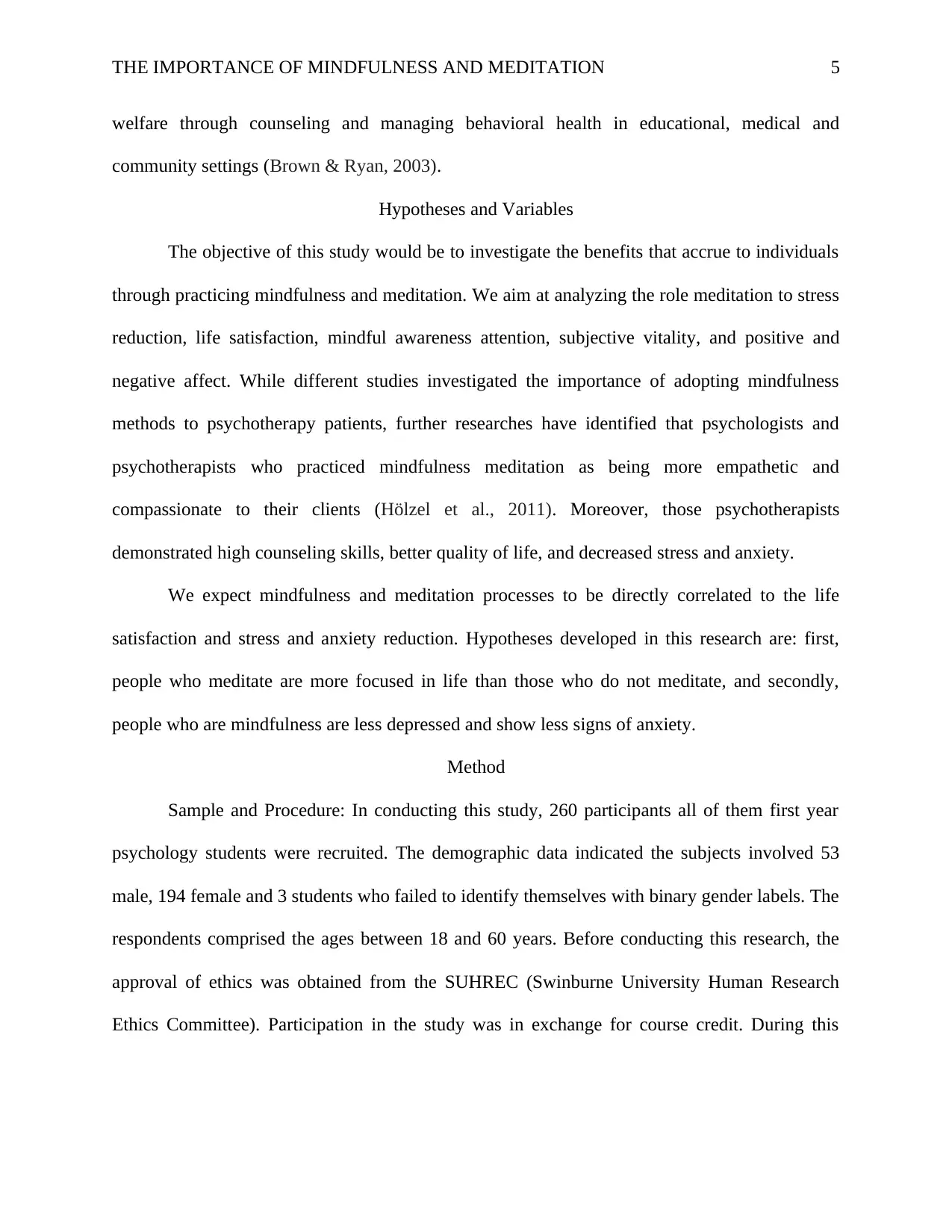
THE IMPORTANCE OF MINDFULNESS AND MEDITATION 5
welfare through counseling and managing behavioral health in educational, medical and
community settings (Brown & Ryan, 2003).
Hypotheses and Variables
The objective of this study would be to investigate the benefits that accrue to individuals
through practicing mindfulness and meditation. We aim at analyzing the role meditation to stress
reduction, life satisfaction, mindful awareness attention, subjective vitality, and positive and
negative affect. While different studies investigated the importance of adopting mindfulness
methods to psychotherapy patients, further researches have identified that psychologists and
psychotherapists who practiced mindfulness meditation as being more empathetic and
compassionate to their clients (Hölzel et al., 2011). Moreover, those psychotherapists
demonstrated high counseling skills, better quality of life, and decreased stress and anxiety.
We expect mindfulness and meditation processes to be directly correlated to the life
satisfaction and stress and anxiety reduction. Hypotheses developed in this research are: first,
people who meditate are more focused in life than those who do not meditate, and secondly,
people who are mindfulness are less depressed and show less signs of anxiety.
Method
Sample and Procedure: In conducting this study, 260 participants all of them first year
psychology students were recruited. The demographic data indicated the subjects involved 53
male, 194 female and 3 students who failed to identify themselves with binary gender labels. The
respondents comprised the ages between 18 and 60 years. Before conducting this research, the
approval of ethics was obtained from the SUHREC (Swinburne University Human Research
Ethics Committee). Participation in the study was in exchange for course credit. During this
welfare through counseling and managing behavioral health in educational, medical and
community settings (Brown & Ryan, 2003).
Hypotheses and Variables
The objective of this study would be to investigate the benefits that accrue to individuals
through practicing mindfulness and meditation. We aim at analyzing the role meditation to stress
reduction, life satisfaction, mindful awareness attention, subjective vitality, and positive and
negative affect. While different studies investigated the importance of adopting mindfulness
methods to psychotherapy patients, further researches have identified that psychologists and
psychotherapists who practiced mindfulness meditation as being more empathetic and
compassionate to their clients (Hölzel et al., 2011). Moreover, those psychotherapists
demonstrated high counseling skills, better quality of life, and decreased stress and anxiety.
We expect mindfulness and meditation processes to be directly correlated to the life
satisfaction and stress and anxiety reduction. Hypotheses developed in this research are: first,
people who meditate are more focused in life than those who do not meditate, and secondly,
people who are mindfulness are less depressed and show less signs of anxiety.
Method
Sample and Procedure: In conducting this study, 260 participants all of them first year
psychology students were recruited. The demographic data indicated the subjects involved 53
male, 194 female and 3 students who failed to identify themselves with binary gender labels. The
respondents comprised the ages between 18 and 60 years. Before conducting this research, the
approval of ethics was obtained from the SUHREC (Swinburne University Human Research
Ethics Committee). Participation in the study was in exchange for course credit. During this
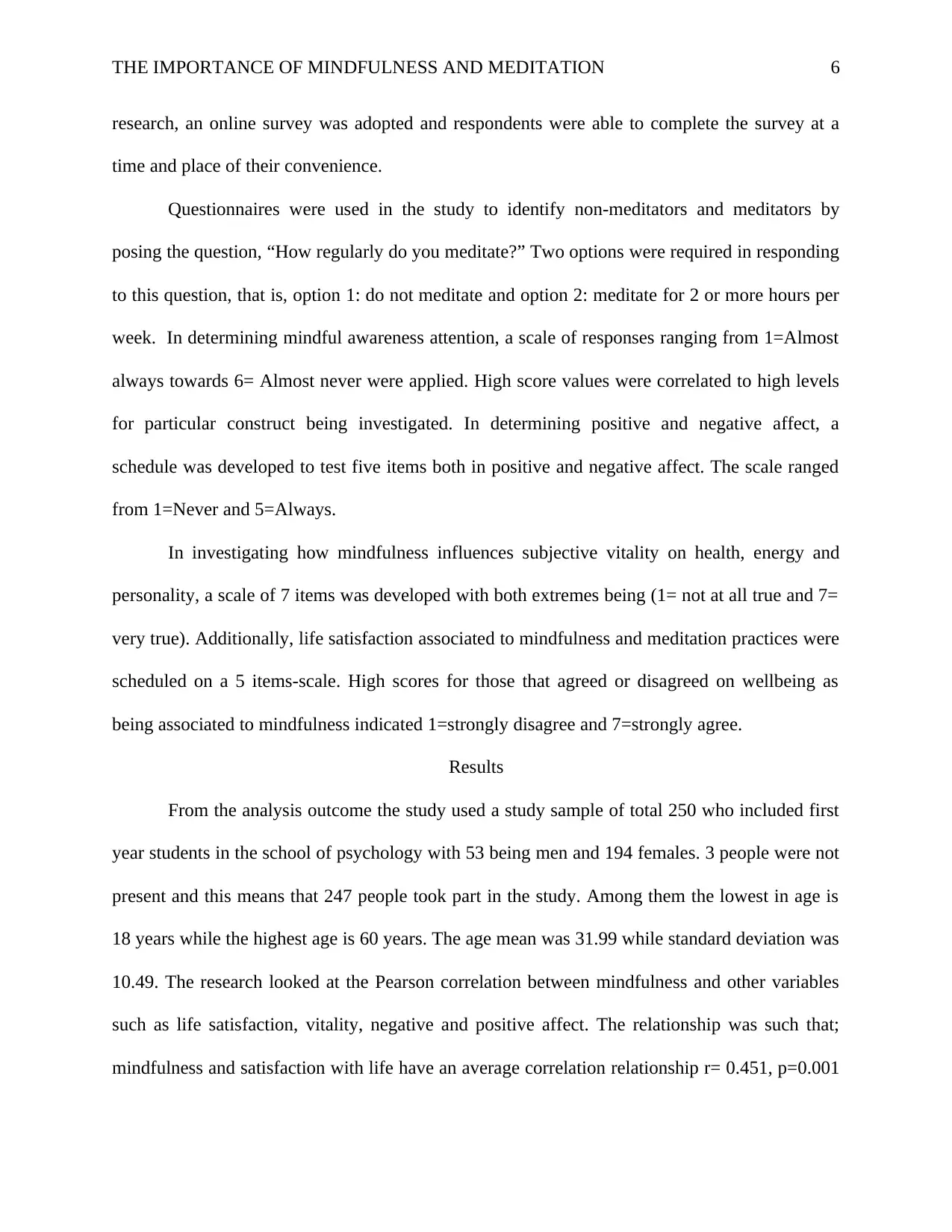
THE IMPORTANCE OF MINDFULNESS AND MEDITATION 6
research, an online survey was adopted and respondents were able to complete the survey at a
time and place of their convenience.
Questionnaires were used in the study to identify non-meditators and meditators by
posing the question, “How regularly do you meditate?” Two options were required in responding
to this question, that is, option 1: do not meditate and option 2: meditate for 2 or more hours per
week. In determining mindful awareness attention, a scale of responses ranging from 1=Almost
always towards 6= Almost never were applied. High score values were correlated to high levels
for particular construct being investigated. In determining positive and negative affect, a
schedule was developed to test five items both in positive and negative affect. The scale ranged
from 1=Never and 5=Always.
In investigating how mindfulness influences subjective vitality on health, energy and
personality, a scale of 7 items was developed with both extremes being (1= not at all true and 7=
very true). Additionally, life satisfaction associated to mindfulness and meditation practices were
scheduled on a 5 items-scale. High scores for those that agreed or disagreed on wellbeing as
being associated to mindfulness indicated 1=strongly disagree and 7=strongly agree.
Results
From the analysis outcome the study used a study sample of total 250 who included first
year students in the school of psychology with 53 being men and 194 females. 3 people were not
present and this means that 247 people took part in the study. Among them the lowest in age is
18 years while the highest age is 60 years. The age mean was 31.99 while standard deviation was
10.49. The research looked at the Pearson correlation between mindfulness and other variables
such as life satisfaction, vitality, negative and positive affect. The relationship was such that;
mindfulness and satisfaction with life have an average correlation relationship r= 0.451, p=0.001
research, an online survey was adopted and respondents were able to complete the survey at a
time and place of their convenience.
Questionnaires were used in the study to identify non-meditators and meditators by
posing the question, “How regularly do you meditate?” Two options were required in responding
to this question, that is, option 1: do not meditate and option 2: meditate for 2 or more hours per
week. In determining mindful awareness attention, a scale of responses ranging from 1=Almost
always towards 6= Almost never were applied. High score values were correlated to high levels
for particular construct being investigated. In determining positive and negative affect, a
schedule was developed to test five items both in positive and negative affect. The scale ranged
from 1=Never and 5=Always.
In investigating how mindfulness influences subjective vitality on health, energy and
personality, a scale of 7 items was developed with both extremes being (1= not at all true and 7=
very true). Additionally, life satisfaction associated to mindfulness and meditation practices were
scheduled on a 5 items-scale. High scores for those that agreed or disagreed on wellbeing as
being associated to mindfulness indicated 1=strongly disagree and 7=strongly agree.
Results
From the analysis outcome the study used a study sample of total 250 who included first
year students in the school of psychology with 53 being men and 194 females. 3 people were not
present and this means that 247 people took part in the study. Among them the lowest in age is
18 years while the highest age is 60 years. The age mean was 31.99 while standard deviation was
10.49. The research looked at the Pearson correlation between mindfulness and other variables
such as life satisfaction, vitality, negative and positive affect. The relationship was such that;
mindfulness and satisfaction with life have an average correlation relationship r= 0.451, p=0.001
⊘ This is a preview!⊘
Do you want full access?
Subscribe today to unlock all pages.

Trusted by 1+ million students worldwide
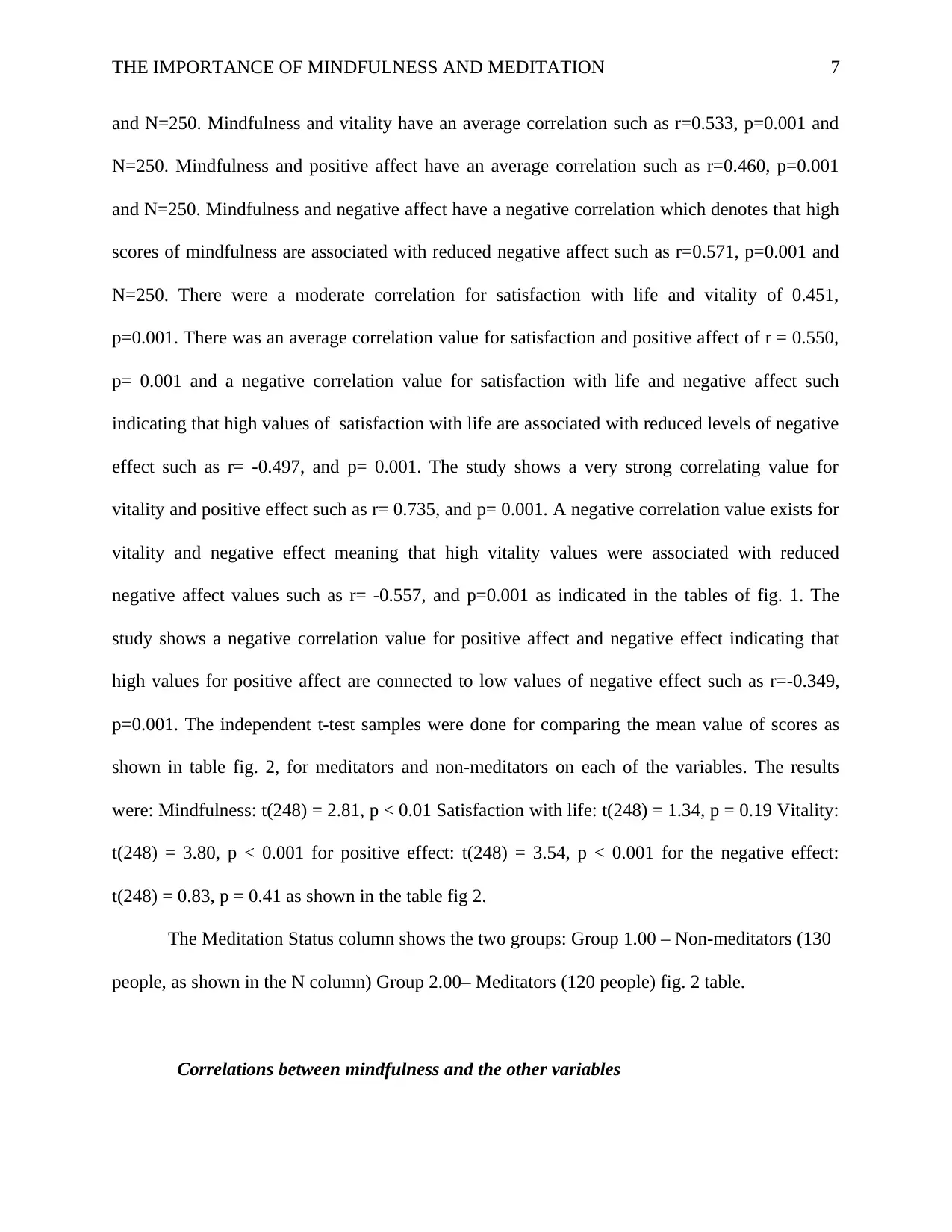
THE IMPORTANCE OF MINDFULNESS AND MEDITATION 7
and N=250. Mindfulness and vitality have an average correlation such as r=0.533, p=0.001 and
N=250. Mindfulness and positive affect have an average correlation such as r=0.460, p=0.001
and N=250. Mindfulness and negative affect have a negative correlation which denotes that high
scores of mindfulness are associated with reduced negative affect such as r=0.571, p=0.001 and
N=250. There were a moderate correlation for satisfaction with life and vitality of 0.451,
p=0.001. There was an average correlation value for satisfaction and positive affect of r = 0.550,
p= 0.001 and a negative correlation value for satisfaction with life and negative affect such
indicating that high values of satisfaction with life are associated with reduced levels of negative
effect such as r= -0.497, and p= 0.001. The study shows a very strong correlating value for
vitality and positive effect such as r= 0.735, and p= 0.001. A negative correlation value exists for
vitality and negative effect meaning that high vitality values were associated with reduced
negative affect values such as r= -0.557, and p=0.001 as indicated in the tables of fig. 1. The
study shows a negative correlation value for positive affect and negative effect indicating that
high values for positive affect are connected to low values of negative effect such as r=-0.349,
p=0.001. The independent t-test samples were done for comparing the mean value of scores as
shown in table fig. 2, for meditators and non-meditators on each of the variables. The results
were: Mindfulness: t(248) = 2.81, p < 0.01 Satisfaction with life: t(248) = 1.34, p = 0.19 Vitality:
t(248) = 3.80, p < 0.001 for positive effect: t(248) = 3.54, p < 0.001 for the negative effect:
t(248) = 0.83, p = 0.41 as shown in the table fig 2.
The Meditation Status column shows the two groups: Group 1.00 – Non-meditators (130
people, as shown in the N column) Group 2.00– Meditators (120 people) fig. 2 table.
Correlations between mindfulness and the other variables
and N=250. Mindfulness and vitality have an average correlation such as r=0.533, p=0.001 and
N=250. Mindfulness and positive affect have an average correlation such as r=0.460, p=0.001
and N=250. Mindfulness and negative affect have a negative correlation which denotes that high
scores of mindfulness are associated with reduced negative affect such as r=0.571, p=0.001 and
N=250. There were a moderate correlation for satisfaction with life and vitality of 0.451,
p=0.001. There was an average correlation value for satisfaction and positive affect of r = 0.550,
p= 0.001 and a negative correlation value for satisfaction with life and negative affect such
indicating that high values of satisfaction with life are associated with reduced levels of negative
effect such as r= -0.497, and p= 0.001. The study shows a very strong correlating value for
vitality and positive effect such as r= 0.735, and p= 0.001. A negative correlation value exists for
vitality and negative effect meaning that high vitality values were associated with reduced
negative affect values such as r= -0.557, and p=0.001 as indicated in the tables of fig. 1. The
study shows a negative correlation value for positive affect and negative effect indicating that
high values for positive affect are connected to low values of negative effect such as r=-0.349,
p=0.001. The independent t-test samples were done for comparing the mean value of scores as
shown in table fig. 2, for meditators and non-meditators on each of the variables. The results
were: Mindfulness: t(248) = 2.81, p < 0.01 Satisfaction with life: t(248) = 1.34, p = 0.19 Vitality:
t(248) = 3.80, p < 0.001 for positive effect: t(248) = 3.54, p < 0.001 for the negative effect:
t(248) = 0.83, p = 0.41 as shown in the table fig 2.
The Meditation Status column shows the two groups: Group 1.00 – Non-meditators (130
people, as shown in the N column) Group 2.00– Meditators (120 people) fig. 2 table.
Correlations between mindfulness and the other variables
Paraphrase This Document
Need a fresh take? Get an instant paraphrase of this document with our AI Paraphraser
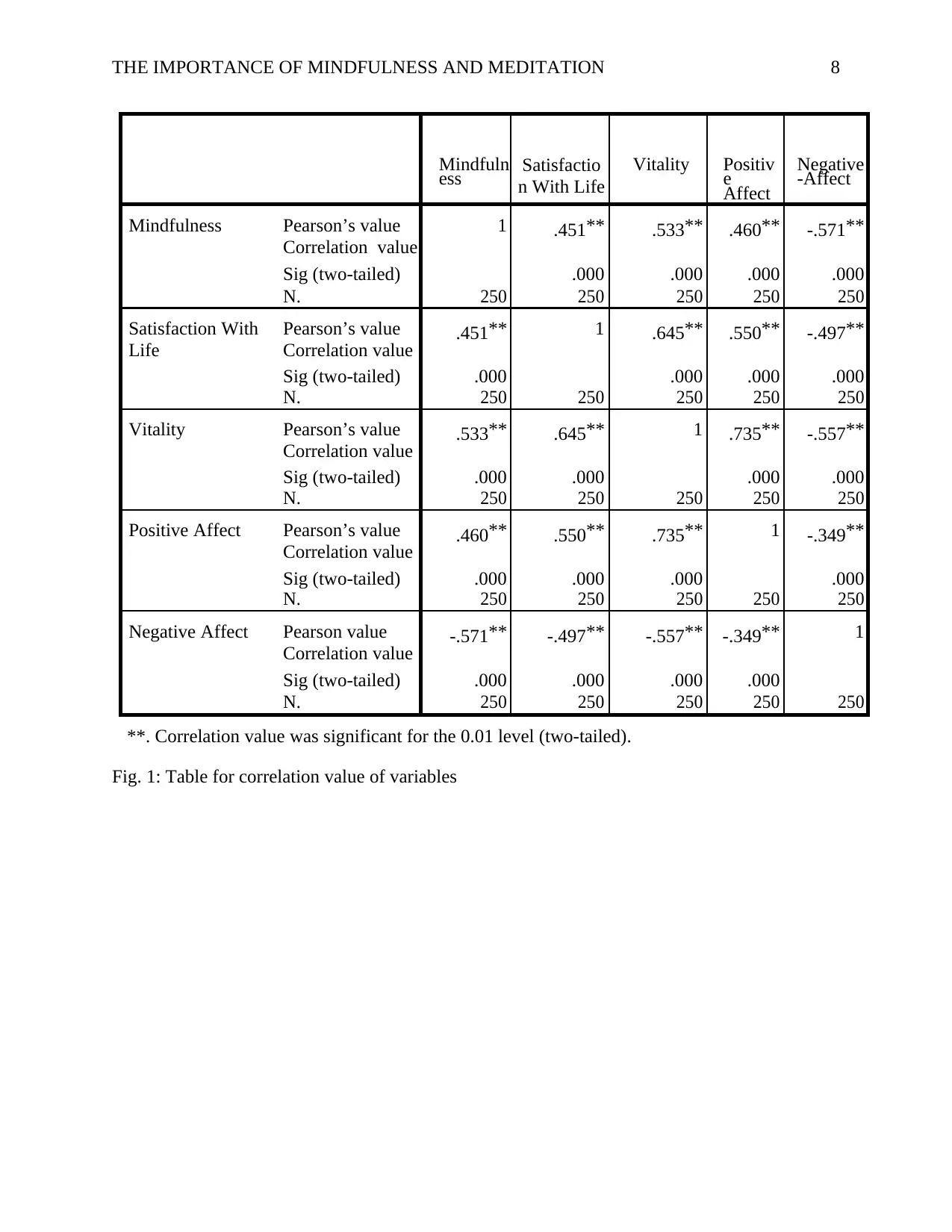
THE IMPORTANCE OF MINDFULNESS AND MEDITATION 8
Mindfuln
ess Satisfactio
n With Life
Vitality Positiv
e
Affect
Negative
-Affect
Mindfulness Pearson’s value
Correlation value
1 .451** .533** .460** -.571**
Sig (two-tailed) .000 .000 .000 .000
N. 250 250 250 250 250
Satisfaction With
Life
Pearson’s value
Correlation value .451** 1 .645** .550** -.497**
Sig (two-tailed) .000 .000 .000 .000
N. 250 250 250 250 250
Vitality Pearson’s value
Correlation value .533** .645** 1 .735** -.557**
Sig (two-tailed) .000 .000 .000 .000
N. 250 250 250 250 250
Positive Affect Pearson’s value
Correlation value .460** .550** .735** 1 -.349**
Sig (two-tailed) .000 .000 .000 .000
N. 250 250 250 250 250
Negative Affect Pearson value
Correlation value -.571** -.497** -.557** -.349** 1
Sig (two-tailed) .000 .000 .000 .000
N. 250 250 250 250 250
**. Correlation value was significant for the 0.01 level (two-tailed).
Fig. 1: Table for correlation value of variables
Mindfuln
ess Satisfactio
n With Life
Vitality Positiv
e
Affect
Negative
-Affect
Mindfulness Pearson’s value
Correlation value
1 .451** .533** .460** -.571**
Sig (two-tailed) .000 .000 .000 .000
N. 250 250 250 250 250
Satisfaction With
Life
Pearson’s value
Correlation value .451** 1 .645** .550** -.497**
Sig (two-tailed) .000 .000 .000 .000
N. 250 250 250 250 250
Vitality Pearson’s value
Correlation value .533** .645** 1 .735** -.557**
Sig (two-tailed) .000 .000 .000 .000
N. 250 250 250 250 250
Positive Affect Pearson’s value
Correlation value .460** .550** .735** 1 -.349**
Sig (two-tailed) .000 .000 .000 .000
N. 250 250 250 250 250
Negative Affect Pearson value
Correlation value -.571** -.497** -.557** -.349** 1
Sig (two-tailed) .000 .000 .000 .000
N. 250 250 250 250 250
**. Correlation value was significant for the 0.01 level (two-tailed).
Fig. 1: Table for correlation value of variables
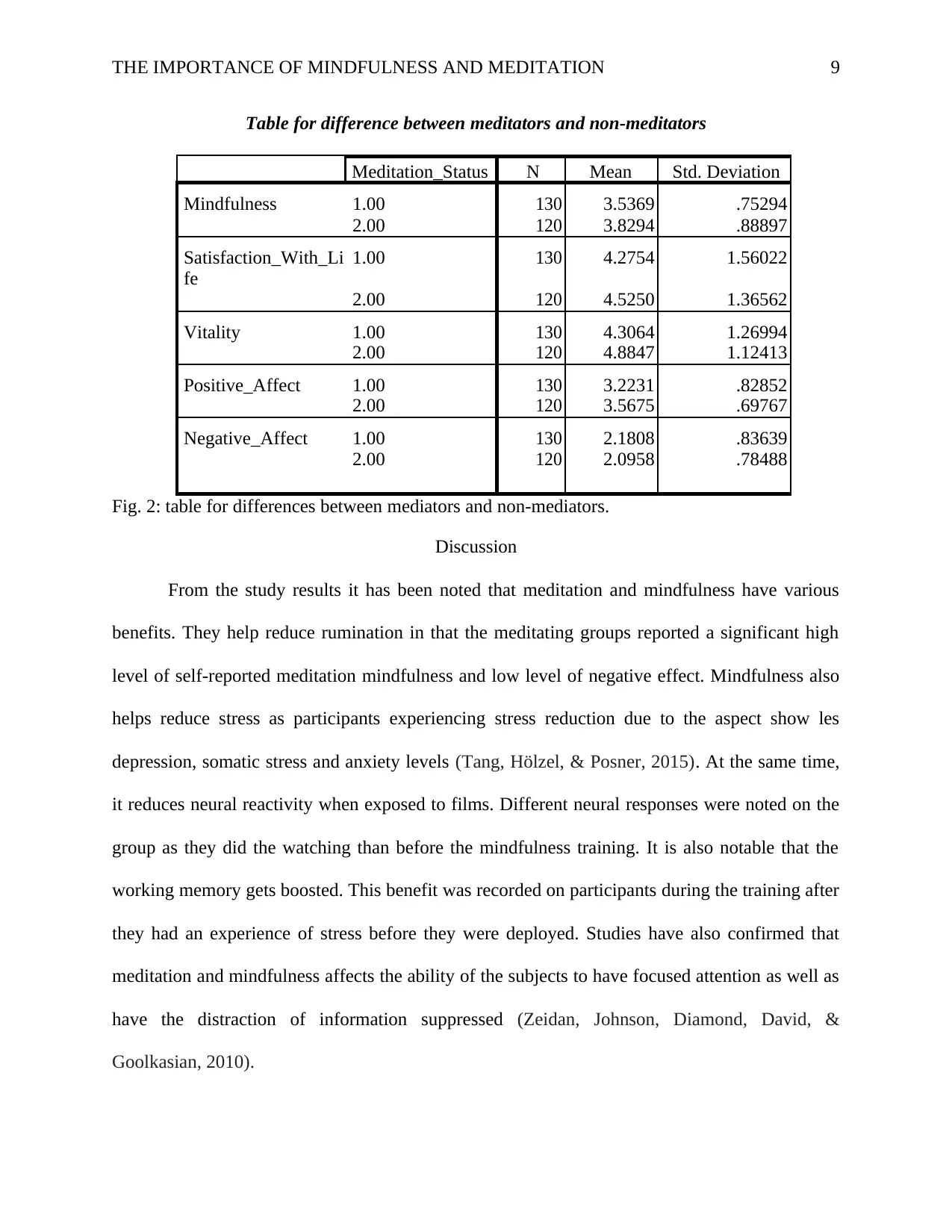
THE IMPORTANCE OF MINDFULNESS AND MEDITATION 9
Table for difference between meditators and non-meditators
Meditation_Status N Mean Std. Deviation
Mindfulness 1.00 130 3.5369 .75294
2.00 120 3.8294 .88897
Satisfaction_With_Li
fe
1.00 130 4.2754 1.56022
2.00 120 4.5250 1.36562
Vitality 1.00 130 4.3064 1.26994
2.00 120 4.8847 1.12413
Positive_Affect 1.00 130 3.2231 .82852
2.00 120 3.5675 .69767
Negative_Affect 1.00 130 2.1808 .83639
2.00 120 2.0958 .78488
Fig. 2: table for differences between mediators and non-mediators.
Discussion
From the study results it has been noted that meditation and mindfulness have various
benefits. They help reduce rumination in that the meditating groups reported a significant high
level of self-reported meditation mindfulness and low level of negative effect. Mindfulness also
helps reduce stress as participants experiencing stress reduction due to the aspect show les
depression, somatic stress and anxiety levels (Tang, Hölzel, & Posner, 2015). At the same time,
it reduces neural reactivity when exposed to films. Different neural responses were noted on the
group as they did the watching than before the mindfulness training. It is also notable that the
working memory gets boosted. This benefit was recorded on participants during the training after
they had an experience of stress before they were deployed. Studies have also confirmed that
meditation and mindfulness affects the ability of the subjects to have focused attention as well as
have the distraction of information suppressed (Zeidan, Johnson, Diamond, David, &
Goolkasian, 2010).
Table for difference between meditators and non-meditators
Meditation_Status N Mean Std. Deviation
Mindfulness 1.00 130 3.5369 .75294
2.00 120 3.8294 .88897
Satisfaction_With_Li
fe
1.00 130 4.2754 1.56022
2.00 120 4.5250 1.36562
Vitality 1.00 130 4.3064 1.26994
2.00 120 4.8847 1.12413
Positive_Affect 1.00 130 3.2231 .82852
2.00 120 3.5675 .69767
Negative_Affect 1.00 130 2.1808 .83639
2.00 120 2.0958 .78488
Fig. 2: table for differences between mediators and non-mediators.
Discussion
From the study results it has been noted that meditation and mindfulness have various
benefits. They help reduce rumination in that the meditating groups reported a significant high
level of self-reported meditation mindfulness and low level of negative effect. Mindfulness also
helps reduce stress as participants experiencing stress reduction due to the aspect show les
depression, somatic stress and anxiety levels (Tang, Hölzel, & Posner, 2015). At the same time,
it reduces neural reactivity when exposed to films. Different neural responses were noted on the
group as they did the watching than before the mindfulness training. It is also notable that the
working memory gets boosted. This benefit was recorded on participants during the training after
they had an experience of stress before they were deployed. Studies have also confirmed that
meditation and mindfulness affects the ability of the subjects to have focused attention as well as
have the distraction of information suppressed (Zeidan, Johnson, Diamond, David, &
Goolkasian, 2010).
⊘ This is a preview!⊘
Do you want full access?
Subscribe today to unlock all pages.

Trusted by 1+ million students worldwide
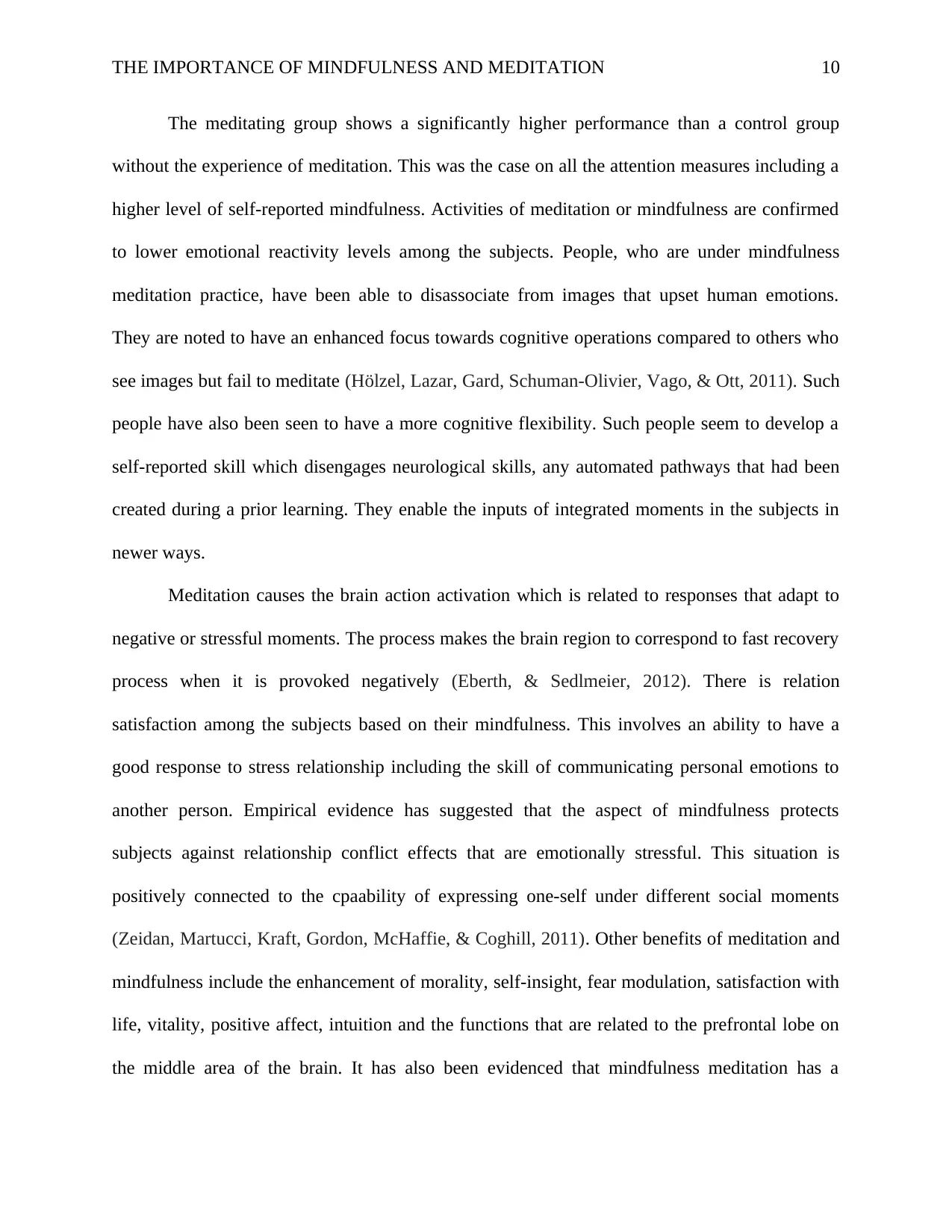
THE IMPORTANCE OF MINDFULNESS AND MEDITATION 10
The meditating group shows a significantly higher performance than a control group
without the experience of meditation. This was the case on all the attention measures including a
higher level of self-reported mindfulness. Activities of meditation or mindfulness are confirmed
to lower emotional reactivity levels among the subjects. People, who are under mindfulness
meditation practice, have been able to disassociate from images that upset human emotions.
They are noted to have an enhanced focus towards cognitive operations compared to others who
see images but fail to meditate (Hölzel, Lazar, Gard, Schuman-Olivier, Vago, & Ott, 2011). Such
people have also been seen to have a more cognitive flexibility. Such people seem to develop a
self-reported skill which disengages neurological skills, any automated pathways that had been
created during a prior learning. They enable the inputs of integrated moments in the subjects in
newer ways.
Meditation causes the brain action activation which is related to responses that adapt to
negative or stressful moments. The process makes the brain region to correspond to fast recovery
process when it is provoked negatively (Eberth, & Sedlmeier, 2012). There is relation
satisfaction among the subjects based on their mindfulness. This involves an ability to have a
good response to stress relationship including the skill of communicating personal emotions to
another person. Empirical evidence has suggested that the aspect of mindfulness protects
subjects against relationship conflict effects that are emotionally stressful. This situation is
positively connected to the cpaability of expressing one-self under different social moments
(Zeidan, Martucci, Kraft, Gordon, McHaffie, & Coghill, 2011). Other benefits of meditation and
mindfulness include the enhancement of morality, self-insight, fear modulation, satisfaction with
life, vitality, positive affect, intuition and the functions that are related to the prefrontal lobe on
the middle area of the brain. It has also been evidenced that mindfulness meditation has a
The meditating group shows a significantly higher performance than a control group
without the experience of meditation. This was the case on all the attention measures including a
higher level of self-reported mindfulness. Activities of meditation or mindfulness are confirmed
to lower emotional reactivity levels among the subjects. People, who are under mindfulness
meditation practice, have been able to disassociate from images that upset human emotions.
They are noted to have an enhanced focus towards cognitive operations compared to others who
see images but fail to meditate (Hölzel, Lazar, Gard, Schuman-Olivier, Vago, & Ott, 2011). Such
people have also been seen to have a more cognitive flexibility. Such people seem to develop a
self-reported skill which disengages neurological skills, any automated pathways that had been
created during a prior learning. They enable the inputs of integrated moments in the subjects in
newer ways.
Meditation causes the brain action activation which is related to responses that adapt to
negative or stressful moments. The process makes the brain region to correspond to fast recovery
process when it is provoked negatively (Eberth, & Sedlmeier, 2012). There is relation
satisfaction among the subjects based on their mindfulness. This involves an ability to have a
good response to stress relationship including the skill of communicating personal emotions to
another person. Empirical evidence has suggested that the aspect of mindfulness protects
subjects against relationship conflict effects that are emotionally stressful. This situation is
positively connected to the cpaability of expressing one-self under different social moments
(Zeidan, Martucci, Kraft, Gordon, McHaffie, & Coghill, 2011). Other benefits of meditation and
mindfulness include the enhancement of morality, self-insight, fear modulation, satisfaction with
life, vitality, positive affect, intuition and the functions that are related to the prefrontal lobe on
the middle area of the brain. It has also been evidenced that mindfulness meditation has a
Paraphrase This Document
Need a fresh take? Get an instant paraphrase of this document with our AI Paraphraser
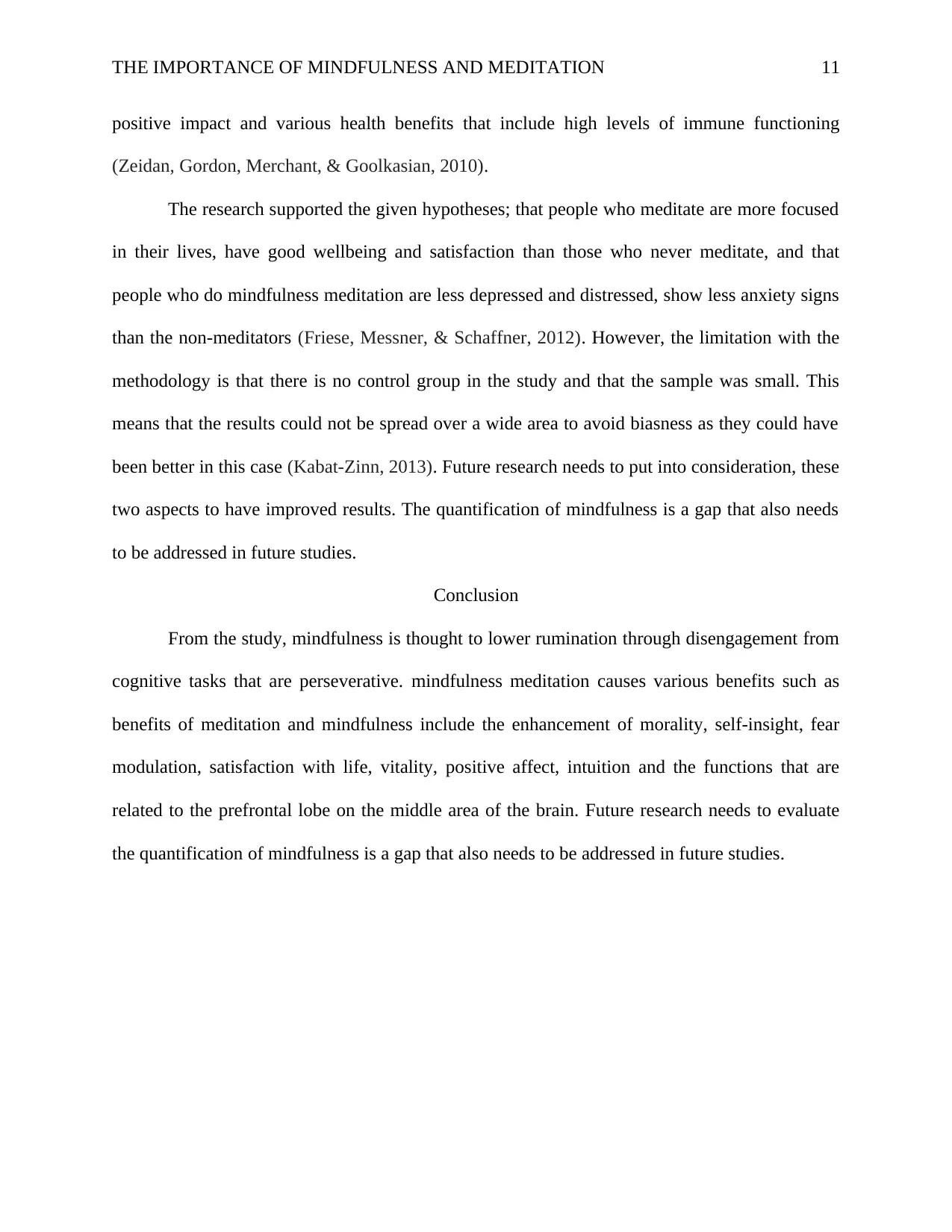
THE IMPORTANCE OF MINDFULNESS AND MEDITATION 11
positive impact and various health benefits that include high levels of immune functioning
(Zeidan, Gordon, Merchant, & Goolkasian, 2010).
The research supported the given hypotheses; that people who meditate are more focused
in their lives, have good wellbeing and satisfaction than those who never meditate, and that
people who do mindfulness meditation are less depressed and distressed, show less anxiety signs
than the non-meditators (Friese, Messner, & Schaffner, 2012). However, the limitation with the
methodology is that there is no control group in the study and that the sample was small. This
means that the results could not be spread over a wide area to avoid biasness as they could have
been better in this case (Kabat-Zinn, 2013). Future research needs to put into consideration, these
two aspects to have improved results. The quantification of mindfulness is a gap that also needs
to be addressed in future studies.
Conclusion
From the study, mindfulness is thought to lower rumination through disengagement from
cognitive tasks that are perseverative. mindfulness meditation causes various benefits such as
benefits of meditation and mindfulness include the enhancement of morality, self-insight, fear
modulation, satisfaction with life, vitality, positive affect, intuition and the functions that are
related to the prefrontal lobe on the middle area of the brain. Future research needs to evaluate
the quantification of mindfulness is a gap that also needs to be addressed in future studies.
positive impact and various health benefits that include high levels of immune functioning
(Zeidan, Gordon, Merchant, & Goolkasian, 2010).
The research supported the given hypotheses; that people who meditate are more focused
in their lives, have good wellbeing and satisfaction than those who never meditate, and that
people who do mindfulness meditation are less depressed and distressed, show less anxiety signs
than the non-meditators (Friese, Messner, & Schaffner, 2012). However, the limitation with the
methodology is that there is no control group in the study and that the sample was small. This
means that the results could not be spread over a wide area to avoid biasness as they could have
been better in this case (Kabat-Zinn, 2013). Future research needs to put into consideration, these
two aspects to have improved results. The quantification of mindfulness is a gap that also needs
to be addressed in future studies.
Conclusion
From the study, mindfulness is thought to lower rumination through disengagement from
cognitive tasks that are perseverative. mindfulness meditation causes various benefits such as
benefits of meditation and mindfulness include the enhancement of morality, self-insight, fear
modulation, satisfaction with life, vitality, positive affect, intuition and the functions that are
related to the prefrontal lobe on the middle area of the brain. Future research needs to evaluate
the quantification of mindfulness is a gap that also needs to be addressed in future studies.
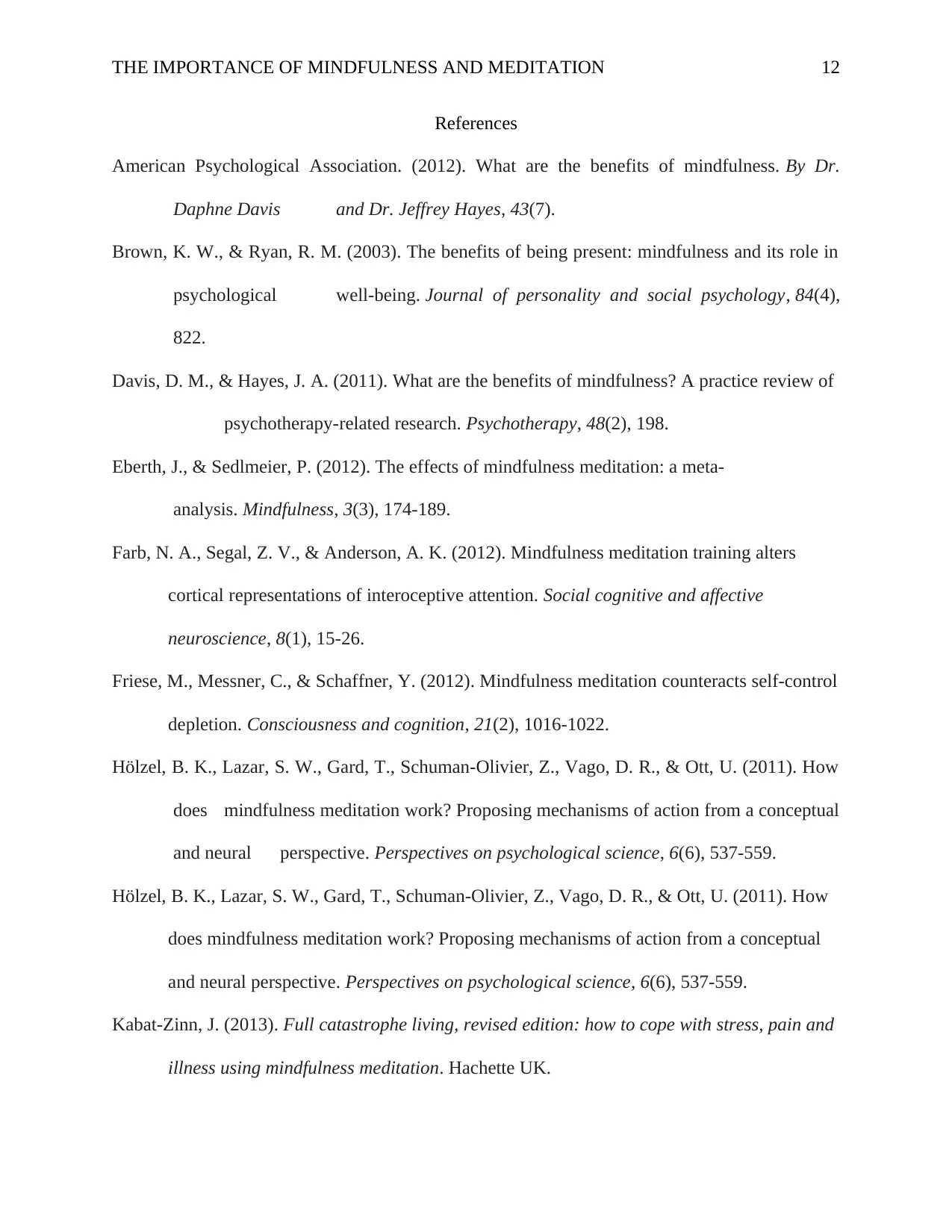
THE IMPORTANCE OF MINDFULNESS AND MEDITATION 12
References
American Psychological Association. (2012). What are the benefits of mindfulness. By Dr.
Daphne Davis and Dr. Jeffrey Hayes, 43(7).
Brown, K. W., & Ryan, R. M. (2003). The benefits of being present: mindfulness and its role in
psychological well-being. Journal of personality and social psychology, 84(4),
822.
Davis, D. M., & Hayes, J. A. (2011). What are the benefits of mindfulness? A practice review of
psychotherapy-related research. Psychotherapy, 48(2), 198.
Eberth, J., & Sedlmeier, P. (2012). The effects of mindfulness meditation: a meta-
analysis. Mindfulness, 3(3), 174-189.
Farb, N. A., Segal, Z. V., & Anderson, A. K. (2012). Mindfulness meditation training alters
cortical representations of interoceptive attention. Social cognitive and affective
neuroscience, 8(1), 15-26.
Friese, M., Messner, C., & Schaffner, Y. (2012). Mindfulness meditation counteracts self-control
depletion. Consciousness and cognition, 21(2), 1016-1022.
Hölzel, B. K., Lazar, S. W., Gard, T., Schuman-Olivier, Z., Vago, D. R., & Ott, U. (2011). How
does mindfulness meditation work? Proposing mechanisms of action from a conceptual
and neural perspective. Perspectives on psychological science, 6(6), 537-559.
Hölzel, B. K., Lazar, S. W., Gard, T., Schuman-Olivier, Z., Vago, D. R., & Ott, U. (2011). How
does mindfulness meditation work? Proposing mechanisms of action from a conceptual
and neural perspective. Perspectives on psychological science, 6(6), 537-559.
Kabat-Zinn, J. (2013). Full catastrophe living, revised edition: how to cope with stress, pain and
illness using mindfulness meditation. Hachette UK.
References
American Psychological Association. (2012). What are the benefits of mindfulness. By Dr.
Daphne Davis and Dr. Jeffrey Hayes, 43(7).
Brown, K. W., & Ryan, R. M. (2003). The benefits of being present: mindfulness and its role in
psychological well-being. Journal of personality and social psychology, 84(4),
822.
Davis, D. M., & Hayes, J. A. (2011). What are the benefits of mindfulness? A practice review of
psychotherapy-related research. Psychotherapy, 48(2), 198.
Eberth, J., & Sedlmeier, P. (2012). The effects of mindfulness meditation: a meta-
analysis. Mindfulness, 3(3), 174-189.
Farb, N. A., Segal, Z. V., & Anderson, A. K. (2012). Mindfulness meditation training alters
cortical representations of interoceptive attention. Social cognitive and affective
neuroscience, 8(1), 15-26.
Friese, M., Messner, C., & Schaffner, Y. (2012). Mindfulness meditation counteracts self-control
depletion. Consciousness and cognition, 21(2), 1016-1022.
Hölzel, B. K., Lazar, S. W., Gard, T., Schuman-Olivier, Z., Vago, D. R., & Ott, U. (2011). How
does mindfulness meditation work? Proposing mechanisms of action from a conceptual
and neural perspective. Perspectives on psychological science, 6(6), 537-559.
Hölzel, B. K., Lazar, S. W., Gard, T., Schuman-Olivier, Z., Vago, D. R., & Ott, U. (2011). How
does mindfulness meditation work? Proposing mechanisms of action from a conceptual
and neural perspective. Perspectives on psychological science, 6(6), 537-559.
Kabat-Zinn, J. (2013). Full catastrophe living, revised edition: how to cope with stress, pain and
illness using mindfulness meditation. Hachette UK.
⊘ This is a preview!⊘
Do you want full access?
Subscribe today to unlock all pages.

Trusted by 1+ million students worldwide
1 out of 13
Related Documents
Your All-in-One AI-Powered Toolkit for Academic Success.
+13062052269
info@desklib.com
Available 24*7 on WhatsApp / Email
![[object Object]](/_next/static/media/star-bottom.7253800d.svg)
Unlock your academic potential
Copyright © 2020–2026 A2Z Services. All Rights Reserved. Developed and managed by ZUCOL.



